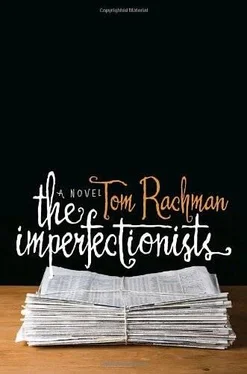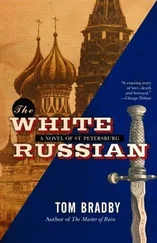Betty moved back to New York and found a desk job, editing features at a women's magazine that specialized in recipes utilizing cans of condensed mushroom soup. She rented a one-bedroom apartment in Brooklyn that overlooked a primary-school playground and, every weekday morning, awoke to children's squeals. She pulled her dressing gown from the nail on the door and sat at the window, watching them: boys wrestling, examining bleeding kneecaps, resuming battle; new girls casting about for friends, digging their hands into pinafore pockets.
Betty never did return to Rome.
"THE SEX LIVES OF ISLAMIC EXTREMISTS"
CAIRO STRINGER-WINSTON CHEUNG
HE LIES UNDER THE CEILING FAN, WONDERING HOW TO START. Every day in Cairo, news events take place. But where? At what time? He connects his laptop and reads the local press online but remains bewildered. These news conferences-how does one get in? And where does one obtain official statements? He wanders around his neighborhood, Zamalek, vaguely hoping a bomb might explode-not too close, of course, but within safe note-taking distance. He'd make front page of the paper, get his first byline.
No bombs go off that day, however. Nor in the following days. He checks his email constantly, anticipating a flaming missive from Menzies demanding to know what in hell he's doing. Instead, Winston finds an email from another person trying out for the Cairo stringer position, Rich Snyder, who announces his imminent arrival, ending with the line "Can't wait to see you!"
That's friendly, Winston thinks. But are we supposed to meet up? He composes a cordial response: "I hope you have a safe flight. Regards, Winston."
This prompts an immediate answer: "Hope you can pick me up! See you there!" He includes his flight number and arrival time.
Is Winston expected to fetch the man from the airport? Aren't they rivals? Perhaps it's professional courtesy. Nobody from the paper mentioned this. Then again, he hasn't a clue how journalism works. Since he has nothing else to do, he takes a taxi to Cairo International.
"You came all the way out here-that is so awesome," Snyder says. He grips the younger man's shoulder and lets a bag slide from his own. Snyder is nearing fifty and wears an army surplus jacket and a white T-shirt, souvenir dog tags clinking around his neck. A corona of thick curly hair encircles his head and pinprick eyes dart about under a thick brow. It's hard for Winston to ignore: Snyder resembles a baboon.
"Wicked to be back in the Mideast," Snyder says. "I am so exhausted, you have no idea. Just got back from the AIDS conf."
"The AIDS what?"
"The AIDS conference in Bucharest. It's so dumb-I hate getting awards. And journalism is not a competition. It's not about that, you know. But whatever."
"You won an award?"
"No big deal. Just for the series I did for the paper on Gypsy AIDS babies. You saw that, right?"
"Uhm, I think maybe. Possibly."
"Bro, where have you been? It got suggested for a Pulitzer."
"You've been nominated for a Pulitzer Prize?"
"Suggested," Snyder specifies. "Suggested for one. What pisses me off is that the international community refuses to act. It's like nobody cares about Gypsy AIDS babies. In terms of the Pulitzer." He points to his carry-on bag. "You mind lugging that to the car? I've got serious vertebrae issues. Cheers." He snaps open his cellphone to check the screen. "I'm totally paranoid-keep thinking I'm gonna call someone by mistake while I'm talking about them. This thing is off, right?" He snaps it shut. "I love Kathleen," he continues. "Don't you love her? She is so great. When she was at her old job, Kath was always trying to hire me as, like, Washington 's main national-desk writer. But I was deep in Afghanistan at the time, so I was, like, 'Appreciate that, but your timing sucks.' She's still kicking herself. Missed ops. Whatever. You dig her?"
"Kathleen? I don't know her that well-I only met her once, actually, at a conference in Rome."
Snyder continues snapping his mobile open and shut. "Entre nous," he confides, "she's a bitch. Those aren't my words. That's what people say, entre nous. I myself hate the word 'bitch.' But I'm a feminist." He checks his phone. "Keep that entre nous, 'kay?"
"That you're a feminist?"
"No, no-tell people that. I'm saying, entre nous, Kathleen is out of her league, according to some people. Some say 'affirmative action,' though personally I find that term offensive." He walks out to the airport parking lot. "Feel that heat, bro! Which ride is us?"
"I thought we could share a taxi."
Blinking in the sun, Snyder turns to Winston. "How old are you, anyway? Seventeen?"
Winston gets this a lot-puberty left little trace on him; he still can't grow stubble. He attempts to age himself by wearing a suit, but in this muggy climate the most salient effect is sweat; he walks around wiping his face and fogged glasses, generally looking like a panicky congressional page. "I'm twenty-four."
"Little baby," Snyder says. "When I was your age, where was I? In Cambodia reporting on the Killing Fields? Or with the rebels in Zaire? I forget. Whatever. Get the cab door? My back is a mess. Appreciate that." Snyder stretches across the backseat of the taxi. "Dude," he declares, "let's commit some journalism."
Winston compresses himself into the smidgen of backseat not occupied by his rival. The cabbie swivels around, restlessly awaiting instruction, but Snyder continues chattering.
Tentatively, Winston interjects, "Sorry, which hotel are you in?"
"No worries, bro-we can drop you at your place first."
Winston recites his address to the driver.
"Ah," Snyder remarks, an eyebrow raised. "You speak Arabic."
"Not perfectly." He only started studying the language a few weeks earlier, having learned about this stringer position via an email exchange with Menzies. Previously, Winston had been studying primatology at grad school in Minnesota. But, suffering grave doubts about a future within the confines of academia, he made a radical shift, quitting the program to remake himself into a foreign correspondent.
"I'm sure you're awesome at Arabic," Snyder insists. "I remember when I was in the Philippines during People Power back in the 1980s, and everyone's all, like, 'Oh, man, Tagalog is so hard.' And I'm, like, 'Bull.' And within days I'm, like, picking up chicks in Tagalog and stuff. That was after two days. Languages are totally overrated."
"So your Arabic must be excellent."
"Actually, I never speak foreign languages anymore," he explains. "I used to get so keyed into cultures that it was unhealthy. So I only talk in English now. Helps me maintain my objectivity." He squeezes Winston's shoulder. "I'm dying to work out, bro. Where's your gym? You got a gym out here, right? I'm into extreme sports myself: ultramarathons, kitesurfing, tennis. I still got buddies on the tennis circuit. Back in the day, they kept bugging me to turn pro and I was, like, 'I got nothing to prove.'" He gazes out the window, flexing a pectoral muscle. "Where did you come from anyhow?"
"Near Minneapolis."
"Dude," Snyder interrupts, "I mean, where were you working before this?"
"Ah, right, right. Uhm, I freelanced mainly. A bunch of local Minnesota publications." This is a lie: his last piece of writing was a college essay on teaching monkeys sign language (a bad idea, it turns out).
But, thankfully, Snyder isn't interested in fact-checking. "How many places have I reported from now?" he says. "Can't remember. Like, sixty-three? I'm including countries that don't exist anymore. Is that allowed? Whatever. It's just a number, right? How many you up to?"
"Not that many."
"Like, fifty?"
"Ten, maybe." Winston hasn't even visited ten countries.
"Ten versus sixty-three. I doubt they'll take that into consideration when filling this job." He smirks.
Читать дальше












